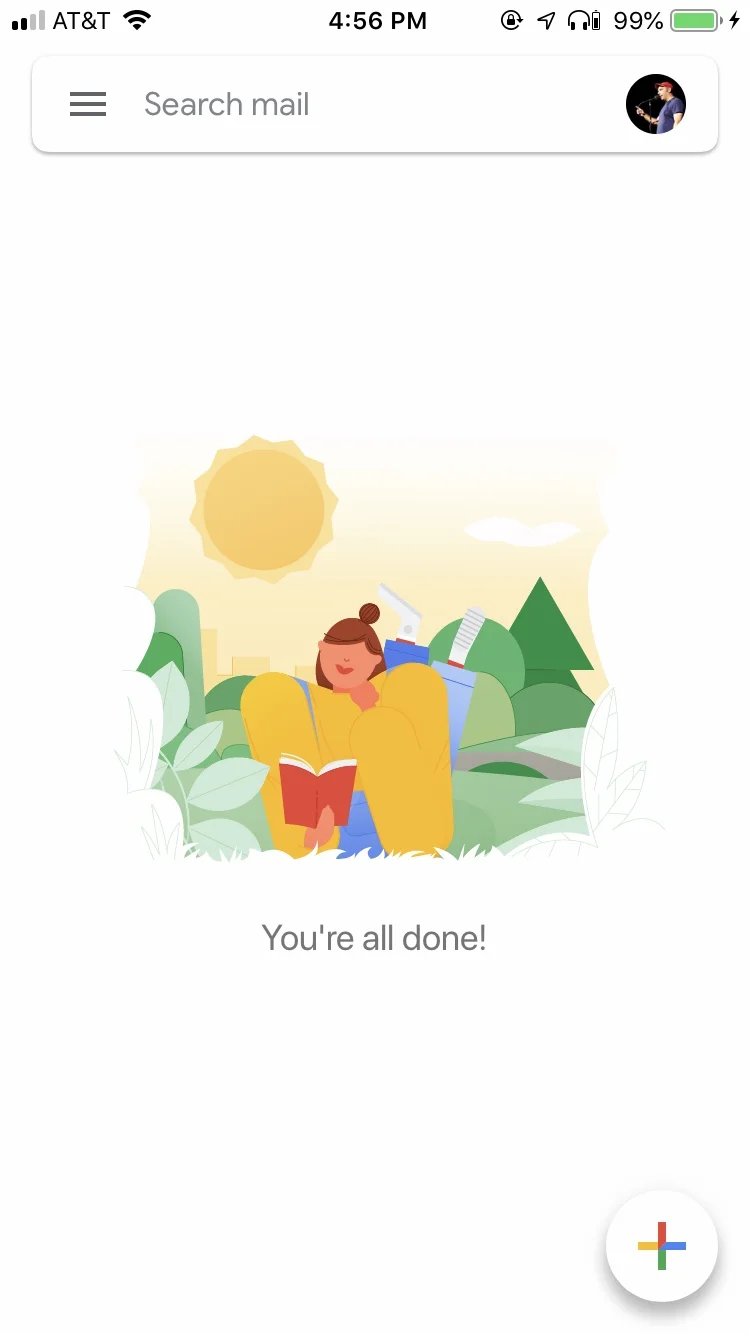Behold!
If you’re using Gmail and also have the Gmail app on your phone, this is what you see when your inbox is empty of email.
Yes, I’m bragging.

In truth, I’m almost always on the verge of Inbox Zero, that fabled land where no email awaits your attention. And lest you think I’m simply filing emails away for a later date, no, I do not maintain a file system in Gmail because I have Gmail.
Gmail allows everything to be archived and makes it searchable at all times. Why create folders when you can simply archive everything and search by name, subject or even single word contained within the email whenever you want?
If you’re not relentlessly trying to save time at all times, you are not valuing time enough.
However, I do reschedule emails to arrive at a more appropriate time, and if you’re not using this simple but powerful feature, please reconsider. It’s invaluable.
For example:
All tax related emails – receipts, royalty statements, foreign payments – are rescheduled to hit my inbox on February 1, 2020, when I will then forward them onto the accountant.
Tickets that I ordered for next week’s Moth StorySLAM will return to my inbox at on the date of the show at 6:00 PM, just before I need them.
Directions and details on a keynote speech that I’ll be delivering in New York in July will return to my inbox three days before the event.
Don’t allow things to clutter your inbox that you don’t need for days, weeks, or months later.
Also, emails that contain important information that I need to complete a project – things like editor’s notes, outlines for conference schedules, and vacation planning – gets moved into Evernote, where a file is created, expanded, and edited when needed. Rather than having six different emails from four different people containing important information about a conference I’m helping to organize, I simply cut and paste the pertinent information into Evernote and archive the emails.
Not only does this clear out the inbox, but it places all information on a single subject into a centrally located file, so I have everything I need at my fingertips when I find myself on a conference call or sitting down to work on the project.
If you’re a person with hundreds or perhaps thousands of email – read and unread – in your inbox, my suggestion is to declare email bankruptcy and start over. Accept the fact that you will never catch up with email unless you return your inbox to a manageable level. Simply open your email program, save the last two unread emails from your boss, significant other, and most important clients, and then archive everything else.
If you’re not using Gmail, create a folder called “Old Stuff I Should Not Touch” and drag it all into the folder. Don’t look at it for six months unless you are forced to find an old email for a very specific purpose.
Then immediately respond to the emails you preserved. Finish them off. Reach Inbox Zero and then commit to an Inbox Zero strategy like the one I’ve described.
Inbox Zero, my friends. It’s honestly not all that common for me to have zero emails in my inbox, but I’m also never more than half a dozen emails away from it, either.
Establish a system. Utilize the tools available to you. Save time. Remove clutter. Become more responsive to those who deserve it. Get more done.








